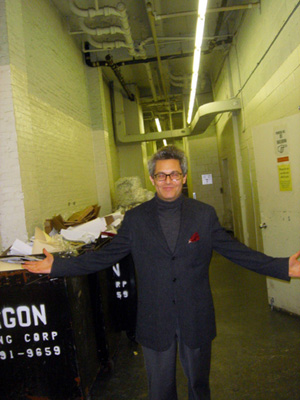
When not in such hallowed precincts as the Public Library, I noticed the taxis a lot this time. It’s like when you’re snorkeling or SCUBA diving and you see schools of one kind of fish. Or, for that matter, like seeing flocks of seagulls or of pigeons. Or herds of cows. This one particular kind of indigenous “animal.”
Their cries can be heard at any hour of the day. From the moment I exit the airport until the moment I leave, the 3D environment is studded with the honks, near and far, hanging out there like Christmas balls, like stars, like raisins in dough. The honks respond to each other like barking dogs.
And when I ride in a taxi and suddenly the road ahead opens up — the joy with which this artificial organism leaps forward, devouring the tenths-of-a-mile.
One day it was raining and a slight man in front of us with a portable umbrella began dancing a soft shoe and singing, yes, “Singin’ In The Rain,” in a light, fine tenor. Channeling Fred and the Bingle. This guy is, however, maybe not quite all there. A taxi pushes its snout through a light and comes to rest blocking our cross-walk. “You’re supposed to stop at the light,” yells the para-Astaire, his good humor melting away. And then in the street he stops to glare at the taxi, perhaps it’s made some gesture of defiance. “You better not get outta there! I’ll break your head!” Emotional lability. But also a bit like a country person scolding a wayward hog. A civic duty to keep the taxis in line.
Looking down from the hotel windows I saw the taxis swarming like paramecia. Their distress when the road was narrowed. Nudging, nuzzling, honking.
We had to laugh at a sign we saw near Times Square. DON’T HONK. FINE $350.

That sign isn't in this picture, this is just a street scene, waking down towards the Flatiron Building, tinily visible in the canyon crack, there to meet my Tor editor David Hartwell. Turns out Frek and the Elixir is now available in paperback, and I thought it wouldn't be till April. Go git it, gaaaahs.


















